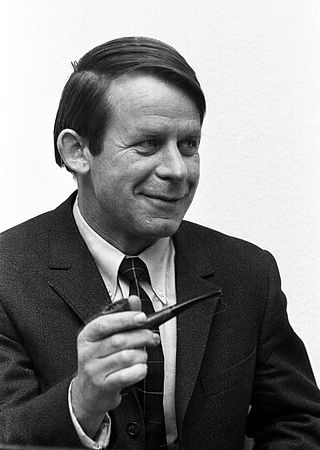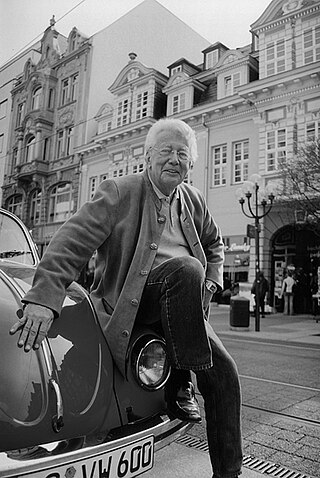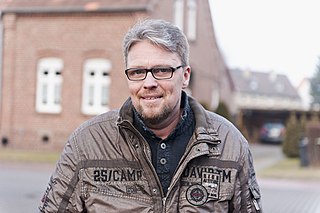Related Research Articles

Die Sendung mit der Maus, often Die Maus, is a German children's television series, popular nationwide for its educational content. The show first aired on 7 March 1971. Originally called Lach- und Sachgeschichten für Fernsehanfänger, it was controversial because West German law prohibited television for children under six years of age. The program was initially condemned by teachers and childcare professionals as bad for children's development, but is now hailed for its ability to convey information to children, having received over 75 awards. On 7 March 1999 the program's Internet site was launched and received 2,400 e-mails and 4 million hits on the first day.

Siegfried Lenz was a German writer of novels, short stories and essays, as well as dramas for radio and the theatre. In 2000 he received the Goethe Prize on the 250th Anniversary of Johann Wolfgang von Goethe's birth. He won the 2010 International Nonino Prize in Italy.

Schnappi das kleine Krokodil is a cartoon character originating from the German children's show Die Sendung mit der Maus. The cartoon's introductory song, "Schnappi, das kleine Krokodil," became an Internet hit before it reached #1 on the German Singles chart in January 2005 and other European countries as well, topping the singles charts in Austria, Belgium, the Netherlands, Norway, Sweden and Switzerland.

Christoph Hein is a German author and translator. He grew up in the village Bad Düben near Leipzig. Being a clergyman's son and thus not allowed to attend the Erweiterte Oberschule in the GDR, he received secondary education at a gymnasium in the western part of Berlin. After his Abitur he jobbed inter alia as assembler, bookseller and assistant director. From 1967 to 1971 Hein studied philosophy in Leipzig and Berlin. Upon graduation, he became a dramatic adviser at the Volksbühne in Berlin, where he worked as a resident writer from 1974. Since 1979 Hein has worked as a freelance writer.

Käpt'n Blaubär is a fictional character created by novelist and comic artist Walter Moers. He is an anthropomorphic talking bear with blue fur who originally appeared in the German children's television program Die Sendung mit der Maus, has since then appeared in a film, a novel, a stage musical and various other media, all of which chronicle the character's life as a sailor and adventurer. Outside of Germany, Captain Bluebear is best known for being the protagonist of Moers' novel The 13½ Lives of Captain Bluebear.
Siegfried Tiefensee was a German musician and conductor.

Techno Viking is an internet phenomenon or meme based on a video from the 2000 Fuckparade in Berlin, Germany.

The Green Screen international wildlife film festival is held annually in and around Eckernförde, Germany. The festival shows full-length and short nature documentaries about animals in their natural habitat. Around 30,000 visitors make it the largest nature film festival in Europe. The awarded trophy is made of sand.

Armin Maiwald is a German author, television director and producer. Maiwald is one of the founders of the award-winning German children's television program, Die Sendung mit der Maus. Often just called Die Maus, the program has been on the air since March 1971 and is one of the most successful children's television programs ever produced. Maiwald has won over 50 awards for his work.

Peter Fritz Willi Lustig was a German television presenter, voice actor and author of children's books who has become especially well known as leading actor in the weekly children's television show Löwenzahn, which he hosted from 1979 up until 2006. During its first year the show was called Pusteblume. He also hosted the show Mittendrin (1987–95), narrated the film Gordos Reise ans Ende der Welt (2007) and provided the German voice for the computer game character Gary Gadget.
Bibliothek der Sachgeschichten (Library of Factual Stories) is a long-running German news series, broadcast since 1992.
Das feuerrote Spielmobil was a German television children's television series, broadcast from April 21, 1972, to July 12, 1981. A total of 184 episodes of the series produced by Bayerischer Rundfunk (BR) were broadcast in the afternoon program of ARD. The concept of the series was developed and produced from 1969 as a successor of the children's series "Spielschule" and shot in Munich, because the BR managers considered, that the social situation in Germany was not correctly represented by Sesamstraße and therefore needed a replacement program.

Dieter Thomas Heck was a German television presenter, singer and actor. He is known as the presenter of the popular TV program ZDF-Hitparade, featuring German Schlager music, from 1969 to 1984, reaching millions of people. As an actor, he starred in the TV play Das Millionenspiel in 1970.

Ralf Schmitz is a German comedian and actor.

Dominik Graf is a German film director. He studied film direction at University of Television and Film Munich, from where he graduated in 1975. While he has directed several theatrically released feature films since the 1980s, he more often finds work in television, focussing primarily on the genres police drama, thriller and crime mystery, although he has also made comedies, melodramas, documentaries and essay films. He is an active participant in public discourse about the values of genre film in Germany, through numerous articles, and interviews, some of which have been collected into a book.

Lydia Benecke is a German criminal psychologist and writer of popular science non-fiction.

Guido Reil is a German politician who is serving as an Alternative for Germany Member of the European Parliament.
Isolde Schmitt-Menzel was a German designer, author, illustrator, graphist, and ceramist.

Ralph Caspers is a German television presenter, author, screenwriter, and actor.

Jens Westphalen is a German wildlife filmmaker, director and film producer. His documentaries have received many awards.
References
- 1 2 "Interview Christoph Biemann" Interview with Christoph Biemann at the 2003 Frankfurt Book Fair. (October 10, 2003) Retrieved November 5, 2010 (in German)
- 1 2 3 Biemann's résumé Christoph Biemann's official website. Retrieved November 17, 2010 (in German)
- 1 2 3 Linda Wilken, „Ich werde für meine Neugier bezahlt.“ Archived 2011-07-22 at the Wayback Machine Interview with Christoph Biemann. (2005) Retrieved November 15, 2010 (in German)
- ↑ Roland Opschondek, Interview with Christoph Biemann Archived 2010-08-08 at the Wayback Machine Globe M - Das Medium zu Kunst und Kultur, official website. (June 6, 2010) Retrieved November 17, 2010 (in German)
- ↑ Stephanie Riechelmann. "Die Sendung mit der Maus: Lach- und Sachgeschichten für Kinder und Erwachsene" Archived 2010-09-07 at the Wayback Machine suite101.de (January 9, 2008) Retrieved November 17, 2010 (in German)
- ↑ "Die Maus fierte ihren 30sten!" Archived 2011-07-19 at the Wayback Machine Was ist was.de Retrieved November 17, 2010 (in German)
- 1 2 3 Dennis Pumm, "Das Interview mit dem Christoph" Archived July 19, 2011, at the Wayback Machine Pumm & Behrmann. Retrieved October 27, 2010 (in German)
- ↑ "HAZ vom 23.10.2009: Das ist der Christoph – der weiß auch nicht alles" Bischofliches Gymnasium Hildesheim, official website. Reprinted from the local newspaper about Biemann's visit to a school to demonstrate scientific experiments. (October 23, 2009) Retrieved November 17, 2010 (in German)
- ↑ Prof. Dr. Lothar Mikos and Dipl.-Medienwiss. Claudia Töpper, "Analyse dramaturgischer und narrativer Strukturen erfolgreicher 'Familiensendungen'" (PDF) Internationales Zentralinstitut für das Jugend- und Bildungsfernsehen, Dr. Maya Götz"] (2009) Retrieved November 17, 2010 (in German)
- ↑ Siegmund Grewenig, "Die Sendung mit der Maus" (PDF) Televizion (April 1991) Retrieved November 17, 2010 (in German)
- ↑ Heidi Hagen-Pekdemir, (September 21, 2010) Retrieved November 17, 2010 (in German)
- ↑ "Interview mit Christoph Biemann" Archived 2011-07-19 at the Wayback Machine Theodor Heuss Gymnasium, school website. Retrieved November 17, 2010 (in German)